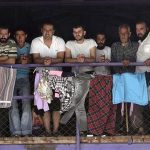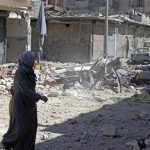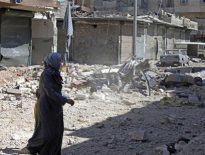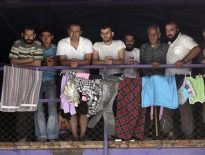(Reuters) – Photographs of Captain Amadou Sanogo – the U.S.-trained infantry officer who toppled Mali’s government in a March coup – are difficult to avoid in the capital Bamako, appearing in newspapers, on stickers plastered inside taxis, and on badges worn by his supporters.
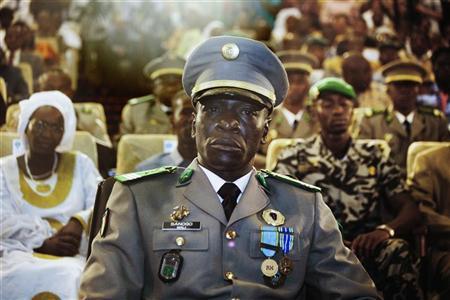
Five months after Sanogo officially ceded power to a transitional civilian government, confusion still reigns over who is really running the West African state, split in two by an Islamist rebel takeover of its mostly desert north.
“There is no one at the helm,” said a Bamako-based diplomat, who asked not to be named, citing infighting within the caretaker civilian administration and public clashes between it and Sanogo’s military camp over key policies.
The political deadlock in Bamako is frustrating Mali’s international backers as the former French colony struggles to navigate its worst crisis since independence: a derailed democracy and a rebellion in the north that has placed al Qaeda-linked gunmen in charge of two thirds of its territory.
Western and regional powers are now convinced that Mali must hold elections to replace its divided leaders before support can be provided for what is seen as an inevitable international military effort to retake the north.
But holding a vote would put off an intervention well into next year, and leave the Islamist rebels – who are destroying ancient tombs and amputating the hands of suspected criminals according to Sharia law – to dig in and further swell their ranks with a mix of local and foreign recruits.
U.S. officials have said elections in Mali must come before any war to retake the north. Burkina Faso President and Mali mediator Blaise Compaore said in a French media interview last week there was no leadership in Bamako.
“Compaore was voicing the concerns of the international community,” another senior diplomat in Bamako told Reuters.
“The political system needs to consolidate and have an election to restore legitimacy. Only a government that is legitimate can recover the north.”
A spokesman for former coup leader Sanogo said Western opposition to any move to recapture the north before elections was “unwelcome”. He argued the rebels posed a global threat.
“COUP NOT OVER YET”
Critics of interim President Dioncounda Traore accuse him of being weak and unable to work with Prime Minister Cheick Modibo Diarra – a man keen to build a political base of his own – and say this is prolonging the political limbo in Bamako.
Overshadowing the civilian pair is the still influential Sanogo, a popular figure in Bamako whom many suspect of being reluctant to fully give up power.
In a sign of mistrust of the mixed-up leadership, neighboring Guinea blocked a shipment of heavy weapons bound for Mali in July saying it was concerned it would end up in the wrong hands.
No issue highlights the quagmire better than the heated debate over to what extent ECOWAS – the West African regional bloc – should back the widely expected military operation to tackle the insurgents in the north.
It took months for regional heads of state to convince Mali’s leaders to officially request military help including troops, as well as cash, weapons, logistics and intelligence assistance.
But even after the request was made, the Malian military balked at elements of the military intervention plan before a flurry of talks has at least partly put it back on track again.
“It is not acceptable that the president says one thing and the soldiers say something else,” said Tiebile Drame, an anti-coup political leader in Bamako. “This shows that the coup is not over yet and the soldiers are not yet ready to accept civilian authority.”
Mali’s military insist any solution to the crisis must be led from within, and they are dead-set against foreign combat forces in Bamako. The anti-intervention camp has also recalled memories of previous West African military missions in Liberia and Sierra Leone, where regional forces were accused of abuses.
A Malian military officer said many in their ranks harbored suspicions that ran even deeper. “(ECOWAS) wants to reverse (the coup) to show that these things can be turned around and should not be tried at home,” he said, asking not to be named.
CAN A DIVIDED NATION VOTE?
In a reminder of how uncertain the situation has become, the Ministry of Defense and other barracks in Bamako are surrounded by vast heaps of sand bags to counter possible attacks.
Proponents of a swift intervention in the north point out that polls could prove politically and logistically difficult with two-thirds of Mali’s territory occupied by insurgents.
“Holding an election without the north would be another way to accept the division of the country,” said Assouamane Maiga, a resident of Timbuktu, the fabled desert trading city now in the hands of al Qaeda-affiliated rebel fighters.
Diplomats, however, say many of Mali’s 400,000 northerners who have been displaced would be able to vote, either in refugee camps in neighboring countries or in the south. Many are sheltering with family and friends.
Western efforts to delay an intervention until after elections could prove unpopular with Malians impatient to see the country reunited, and would fly in the face of urgent calls for action at the United Nations General Assembly in New York.
French Foreign Minister Laurent Fabius on Monday said Mali’s caretaker government wanted the U.N. to approve an “immediate” mandate for an international force to recover the north, citing the country’s “unprecedented security crisis”.
Despite the misgivings, the resurgence of Islamist militancy in the Sahara has forced Mali up the security agenda. One French official said it was now more important in Paris than Syria and labeled AQIM as “a direct and immediate threat”.
The worry now is that a delay in tackling the Islamists could allow them to entrench in Mali and reinforce their ranks, and this in turn could worsen the region’s humanitarian crisis, with tens of thousands of refugees and widespread food insecurity.
NORTH “ABANDONED”
In the six months since the coup, Mali’s army has shown little appetite for taking on the rebels alone.
Tuareg separatists, bolstered by fighters and weapons from Libya’s conflict last year, initially led the offensive southwards before their rebellion was hijacked by their former Islamist allies who displaced them in key northern towns.
The Islamists extended their reach south in early September by taking the town of Douentza uncontested. Some traditional local militia fighters who initially volunteered to fight with Mali’s army have since been lured into the Islamist rebel camp.
As a result, northern residents appear increasingly resigned to life under their new Sharia compliant rulers. “Our lives have changed and our traditions with them,” said Moussa Maiga, a resident of Gao, a city in Mali’s northeast. “We now live in line with the ways of the occupiers … we have no choice.”
Alongside the amputations, the Islamists have also been on a charm offensive to gain local support and recruits. In Gao, they have been credited with restoring a sense of order after an initially chaotic spell under the control of separatist Tuareg fighters.
Residents in Timbuktu get sporadic – but free – electricity. Prices for basic food have eased as there are no more taxes.
“For six months, the (armed) groups have tried to get the support of the population. Meanwhile, the state has abandoned the people. The state will not have the same role in the north again,” said a former minister from the north.
Reuters journalists who visited Gao in recent weeks reported seeing fighters from places as far apart as Western Sahara and Kashmir. A tour guide from Timbuktu said several colleagues had worked as translators for a handful of Pakistani fighters.
Diplomats say the flow of foreign fighters into Mali remains slow but steady and coming mainly from nations in West Africa.
Even without an election to consider, experts say preparations for any regional military intervention will take around six months. They also fear an Islamist retaliation against countries in the region and foreign hostages – mainly French and Algerian – still in the hands of al Qaeda kidnappers.
(Additional reporting by John Irish in Paris, Cheick Diouara in Gao; Editing by Richard Valdmanis, Pascal Fletcher and Giles Elgood)


